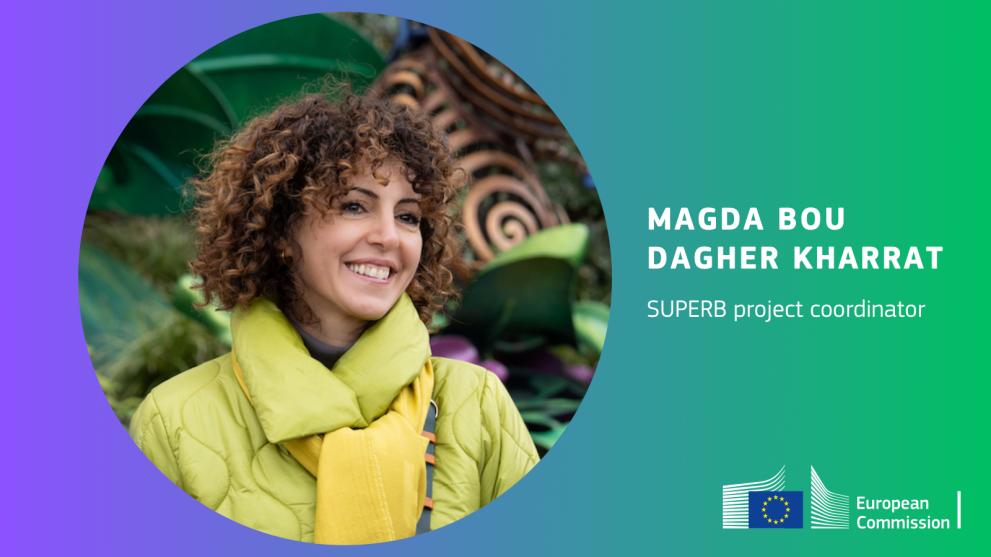
Magda Bou Dagher Kharrat is a scientist. She leads the €20 million EU-funded project SUPERB, which aims to advance forest restoration and adaptation across Europe. The project is one of the biggest Green Deal projects managed by the European Research Executive Agency (REA), with 37 partners.
We asked Magda to reflect on the challenges and achievements she has experienced as a woman in research.
What is it like being a woman coordinator of a large EU-funded project like SUPERB?
The very same it would be for a man! I see coordinating a project funded by the EU more as an exceptional human experience, rather than an experience defined or limited by gender. It is an opportunity to collaborate with top-level scientists from across Europe, manage a diverse community of policy-makers, practitioners, and scientists, and engage with the wider public. Managing challenges and celebrating successes are part of the experience without being constrained by gender expectations. I do believe that leadership qualities and accomplishments are not confined by gender, but flourish in a supportive environment. I hope for my experience to inspire other young men or women to perceive leadership roles based on merit and competence, fostering a more inclusive and equal work environment.
"My experience may inspire other young men or women to perceive leadership roles based on merit and competence, fostering a more inclusive and equal work environment."
As a woman, what has been the biggest challenge you have faced during your scientific career?
When reflecting on challenges in my science career as a woman, one prominent obstacle stands out: achieving work-life balance. Juggling career aspirations with personal and family responsibilities has consistently been a priority for me. The demanding nature of research and academia coincides with the biologically crucial period for starting a family, which can pose issues to career progression. While it is undeniably challenging, it can be overcome. I was able to get support from my partner, family members, and colleagues. Reliable caregiving systems can also make a significant difference in navigating these challenges.
What has been your biggest achievement?
I would say elevating the importance of forest biodiversity conservation when other humanitarian and political crises dominate attention, often putting biodiversity conservation on the back-burner.
During my career I was able to identify ecological problems on the ground, formulate questions, create a research design plan, seek solutions in the laboratory, secure funding, conduct the research, publish findings, and share results with practitioners. Completing this entire cycle has been incredibly rewarding.
How is gender equality integrated in the SUPERB project?
Gender equality is actively integrated into the SUPERB project by recognising and respecting the diverse perspectives and opinions of its participants. Given the varied backgrounds of individuals involved, the project is committed to considering social and cultural differences that may influence participation. When selecting individuals for involvement, gender is taken into account, alongside other factors such as age, education, and background.
Moreover, the project ensures that proposed practices and promoted innovations do not have a negative impact on any segment of society. With a clear commitment to inclusivity, the team boasts a 45% representation of women, and notably, six out of nine hold leadership roles. This intentional approach not only demonstrates a commitment to gender equality but also strives for a balanced and diverse team that can contribute effectively to the project's success.
"When we build workplaces that promote collaboration, mentorship, and mutual support, we empower women to reach their full potential."
In the context of the International Women’s Day, what message would you like to pass on?
Fostering a supportive community and creating a positive work environment are crucial for women to thrive and develop. When we build workplaces that promote collaboration, mentorship, and mutual support, we empower women to reach their full potential.
More about the woman behind the project
Magda Bou Dagher Kharrat is principal scientist at the Mediterranean Facility of the European Forest Institute. She has worked as a professor and chaired the Life and Earth Science Department at the Saint Joseph University of Beirut, where she was also the director of the Laboratory of Biodiversity and Functional Genomics. She holds a PhD in Plant Genetics and is a National Geographic explorer. She is an associate member of the French Academy of Agriculture. Her main research interests are in the fields of conservation and valorisation of Mediterranean natural and cultural heritages and forest resilience.
More information:
Gender in EU research and innovation - How to comply with Horizon Europe funding principles
Upscaling forest restoration (SUPERB) - Project website
Details
- Publication date
- 8 March 2024
- Author
- European Research Executive Agency
